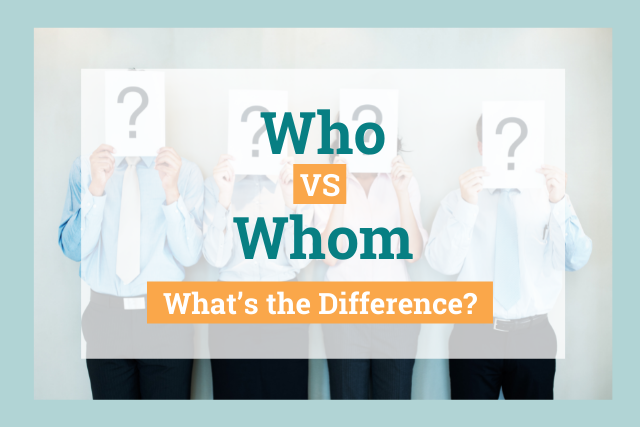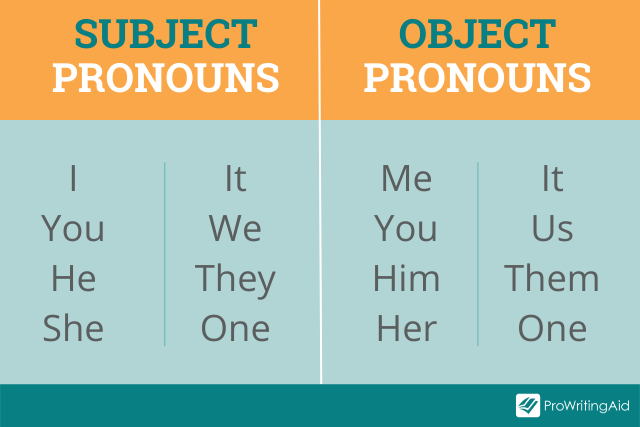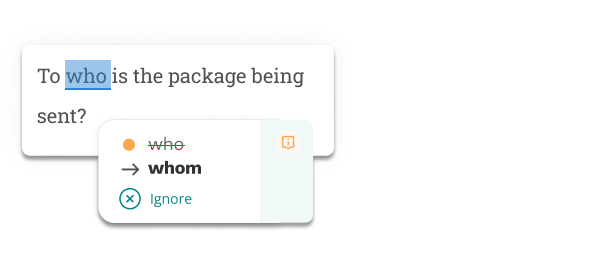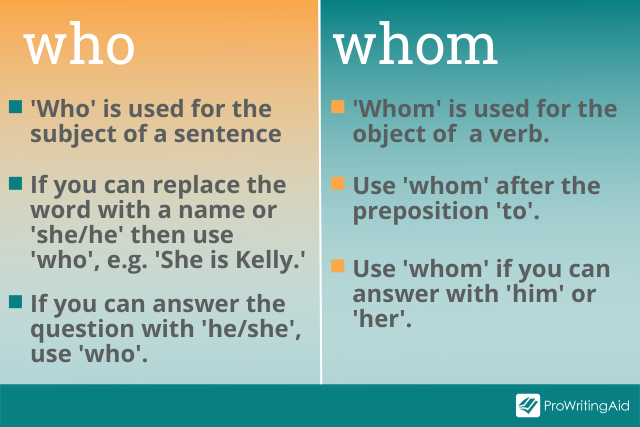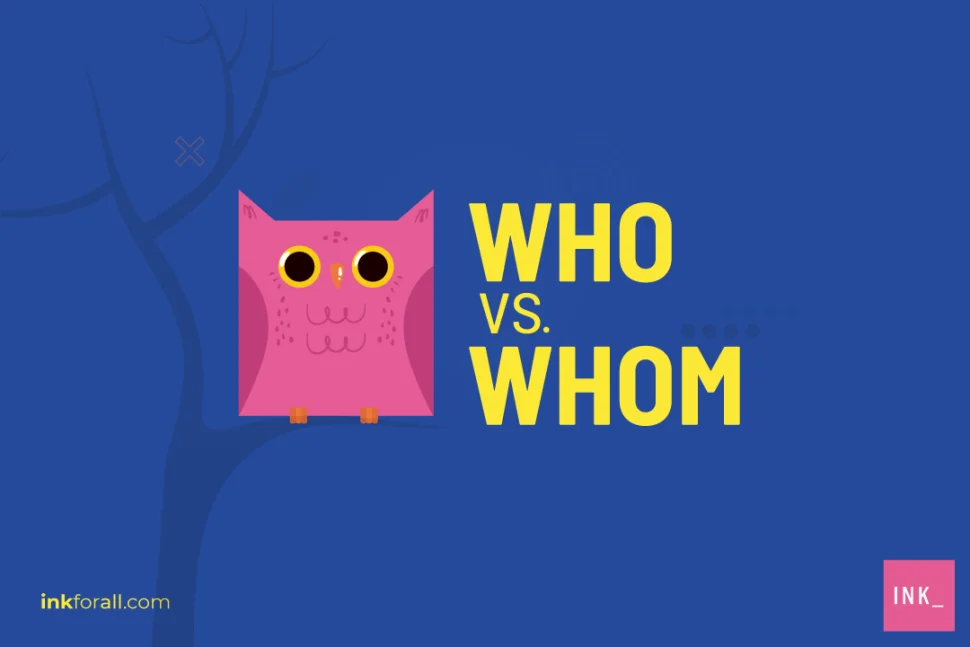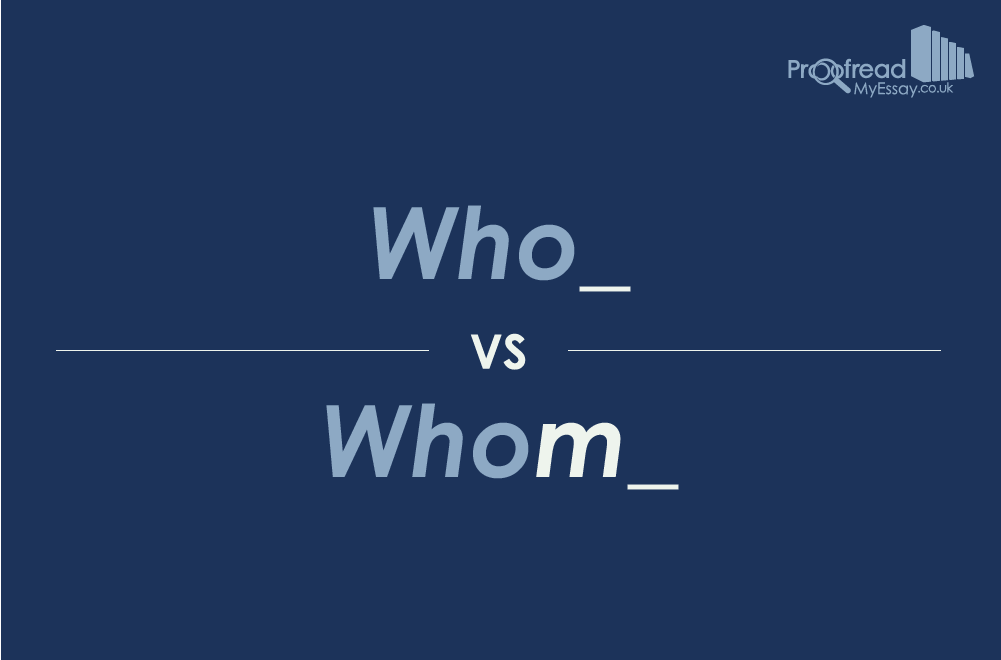The He/Him Test
To begin, the simplest way to determine the correct word is to replace “who” or “whom” with the same part of speech. Try another object pronoun (also called objective pronoun) or subject pronoun (also called subjective pronoun). See if you can substitute the mystery word for either “he” or “him.” When you can replace the word with “him,” you should use “whom,” another objective pronoun. When “he” fits, you should use “who,” another subjective pronoun. You can remember that “him” and “whom” go together—and end with the same letter.
Examples:
Who/whom is hungry?
He is hungry. (Subjective pronoun)
With who/whom did you argue?
I argued with him. (Objective pronoun)
You thanked who/whom?
You thanked him. (Objective pronoun)
Notice that in the second sentence we had to flip around the phrasing in order to determine which word—”he” or “him”—fit best. That’s quite common. Often, in order to replace the word, you’ll need to restate the phrase so that the subject and verb come first, followed by the object. When who/whom appears as an interrogative pronoun, try answering the question as a way of rephrasing the sentence with a subject-verb-object construction.
Here’s another example with an interrogative pronoun:
Example: Who/whom could she ask?
Now, we’ll answer the question.
She could ask him.
In this example, the mystery word is acting as the object of the verb “to ask.” You would never say “She could ask he.” For that reason, “whom,” the objective pronoun, is correct.
Linking Verbs
When you use linking verbs, they describe a state of being, rather than an action. If you use a pronoun with a linking verb, you should always select a subjective pronoun. That’s a rule that has nothing to do with who/whom. It’s just one of those things that makes linking verbs special!
It is I.
It was she.
This is he.
Knowing that, you’ll have a much easier time choosing between “who” and “whom.” You’ll want to choose the subjective pronoun any time you see a linking verb in a sentence with only one clause. Just remember the simple trick: if you see a linking verb, choose “who” in a simple sentence.
It is I.
Who is it? It is who I say it is.
It was she.
Who was it? It was who I thought.
This is he.
Who is this? This is who pulled the fire alarm.
How to Use Whoever and Whomever
Use “whoever” and “whomever” the same way you would use “who” and “whom.”
Whoever/whomever knows the answer gets extra points.
In the example above, you could substitute “he” for the mystery word. He knows the answer. He gets extra points. Once you know you’re looking for a subjective pronoun, the word “whoever” becomes the obvious choice.
Whoever knows the answer gets extra points.
Now, we get to a more difficult use case. What if the sentence is more complicated? If you see two verbs, try to break down the sentence into parts.
I trust whoever/whomever you hire.
In this case, you should use the objective case. Why? Well, first, you break the sentence into two sections.
Section 1:
I trust ____.
Section 2:
You hire ____.
In both sections of the sentence, you would use the objective case. I trust him. You hire him. Therefore, you should complete the sentence with the word “whomever.” I trust whomever you hire. However, if you broke the sentence into two parts and found that you needed both a subjective and an objective pronoun, then you would choose “whoever” instead.
Here’s an example.
I trust whoever/whomever completes the assignment.
Section 1:
I trust _____.
Section 2:
_____ completes the assignment.
This time, you would use both the objective case and the subjective case. I trust him. He completes the assignment. For that reason, you’d choose “whoever.” I trust whoever completes the assignment.
The Object of a Prepositional Phrase
Sometimes you’ll find the mystery word nested in another clause, like a prepositional phrase. If that’s the case, determine whether the word is an object or a subject of a clause. For prepositional phrases, you’ll always choose “whom” because you need the mystery word to act as the object of the prepositional phrase.
Here are some examples of how the word “whom” can be used within a prepositional phrase.
That’s the person about whom I was talking.
For whom were you named?
My aunt, with whom I traveled to Europe, turned eighty.
The person from whom I got my car lied about the mileage.
Those sentences may sound a bit old fashioned, but they follow the rules of proper grammar!
To recap, you should use the words “whom” and “whomever,” on the occasions when you need an objective pronoun. These words work well as the objects of phrases (like prepositional phrases) or the objects of sentences. Either way, without ever diagramming a sentence, you should be able to use the he/him test to decide whether the word “whom” is appropriate. If you’re looking at a particularly challenging sentence, try breaking it into sections to see which word fits best.
Test Your Skills
1) The last plate goes to whoever/whomever.
2) The last plate goes to whoever/whomever gets home first.
3) He was the one who/whom took the prize.
4) Who/whom is calling?
Answers: 1) whomever 2) whoever 3) who 4) who
Sources:
- https://www.thoughtco.com/who-and-whom-1857114
- https://www.english-grammar-revolution.com/who-vs-whom.html
- https://www.proofreadnow.com/blog/who-or-whom-get-it-right-every-time-with-these-3-tricks
- http://www.whitesmoke.com/janestraus_6
The Word Counter is a dynamic online tool used for counting words, characters, sentences, paragraphs, and pages in real time, along with spelling and grammar checking.

Kari Lisa Johnson
I’m an award-winning playwright with a penchant for wordplay. After earning a perfect score on the Writing SAT, I worked my way through Brown University by moonlighting as a Kaplan Test Prep tutor. I received a BA with honors in Literary Arts (Playwriting)—which gave me the opportunity to study under Pulitzer Prize-winner Paula Vogel. In my previous roles as new media producer with Rosetta Stone, director of marketing for global ventures with The Juilliard School, and vice president of digital strategy with Up & Coming Media, I helped develop the voice for international brands. From my home office in Maui, Hawaii, I currently work on freelance and ghostwriting projects.
Who and whom are commonly confused words. In fact, many native English speakers don’t know the difference between them.
However, there is a simple way to determine which word is correct. You should use who to refer to the subject of a sentence, and whom to refer to the object of a sentence.
If you want your writing to sound professional, getting words like who and whom correct is important. Let’s look at these two words in more depth to understand how they work in a sentence.
The Difference Between Who and Whom
Who and whom have the same meaning and are both often used in questions, but in different ways. To choose the correct word, you need to know whether you are referring to the subject or object of the sentence.
- Subject: The person is completing the action in the sentence. Subject pronouns include I, he, she, and they. When describing the subject of a sentence, you need to use the pronoun who.
- Object: The person is receiving the action of the verb. Object pronouns include me, him, her, and them. Use the pronoun whom when describing the object of a sentence.
Let’s look at two examples to spot the difference between the subject and object.
- Sentence A: Who is going to the party?
- Sentence B: Whom should I invite to the party?
In sentence A, you could answer with a person’s name, or with a subject pronoun like she or he. The people are the subject of the sentence.
But in sentence B, whom is the object of the verb invite, and you would answer with an object pronoun like him or her.
Let’s check out another example of how to turn a sentence into a question with the word whom:
- Tony ate the sandwich.
In this sentence, Tony is doing something; he’s eating. That means he’s the subject of the sentence. You could replace Tony’s name with who to form a question:
- Who ate the sandwich?
If we wanted to use whom, we can flip the original sentence and make the sandwich the subject and Tony the object.
- The sandwich was eaten by Tony.
Now the subject of the sentence (the sandwich) is not performing the action. The sandwich isn’t the one doing the eating! We could replace Tony with whom to ask the question:
- By whom was the sandwich eaten?
When to Use Who (Examples in a Sentence)
Not sure if you should use who? Don’t worry; there’s a simple trick to help. All you have to do is see if you could answer the question you’re posing with he or she or they. If you could, then who is correct.
Which of these sentences is correct?
- Sentence A: Who ate my snack?
- Sentence B: Whom ate my snack?
Try answering this question by adding she or he in the answer:
- She ate my snack.
Because you can use she, sentence A is correct: Who ate my snack?
Here are some other example sentences with who:
- Who else wants cake?
- My mother, who immigrated from Chile in the 1980s, has always loved American culture.
- A child who is hungry can’t learn properly.
When to Use Whom (Examples in a Sentence)
So what about when to use whom? Just like in the example above, try answering your own question. If you have to use him or her or them in your reply, you’ll need to use whom.
Which of these sentences is correct?
- Sentence A: To who is the package being sent?
- Sentence B: To whom is the package being sent?
You can only reply to this question by using him, her, or them:
- The package is being sent to him.
That makes the correct answer sentence B: To whom is the package being sent?
Here are some more examples of whom in a sentence:
- Whom are you supporting in the election?
- Whom should I contact about the party?
- Whom do you want to ask to the dance?
Another useful tip is to remember that whom is always used instead of who after the prepositions to, for, with, and of. Here are some examples of whom after a preposition:
- The employee, with whom I spoke, said I could have a refund.
- The children, one of whom dislikes loud noises, will be with us all weekend.
- For whom should I wait?
Many native English speakers don’t use whom at all, thinking it sounds old-fashioned and pretentious. Instead, they will use who for both the subject and object of a sentence. This isn’t correct, but most native English readers won’t notice the error.
If you’re having a conversation with someone, you may spot them using who rather than whom. While this is fine when speaking, it’s always best to use the correct form in writing, especially in professional settings.
On the flipside, some English speakers use whom instead of who in an attempt to sound sophisticated or formal. This is something to avoid, especially in legal and academic writing where this mistake will be obvious. Often, using whom in error to sound intelligent backfires and makes you sound less educated.
Using ProWritingAid’s grammar checker will help you identify if you used who when you meant whom. The English language is hugely complicated so ProWritingAid can give you peace of mind that your writing is error free.
Sign up for a free ProWritingAid account today.
Conclusion on Who vs. Whom
Now we’ve fully explored the differences between who vs. whom, let’s recap the simple ways you can tell which one you need.
Use who if:
- You’re referring to the subject of the sentence
- It can be answered with she or he
Use whom if:
- You’re speaking about the object of the sentence
- The question can be answered with him, her, or them
- It follows the prepositions to, for, of or with
Take your writing to the next level:
20 Editing Tips from Professional Writers
Whether you are writing a novel, essay, article, or email, good writing is an essential part of communicating your ideas.
This guide contains the 20 most important writing tips and techniques from a wide range of professional writers.

What’s the difference between who and whom? These are two words that cause a lot of confusion, even for native-English speakers. So, it’s well worth taking a few minutes to know the difference between the two. Below, we’ve provided an easy guide on understanding the grammatical rules. We’ve also given some examples on how to use who and whom correctly. If you want to avoid mistakes in using who vs whom, read on.
Who vs whom: the grammar rules
There are a few rules when you should use who and whom. “Who” is a subjective pronoun. “Whom” is an objective pronoun. That simply means that “who” is always subject to a verb, and that “whom” is always working as an object in a sentence. We’ve explained what subjects and objects in a sentence are.
But what does that mean? “Who,” the subjective pronoun, is the doer of an action. For example, “That’s the girl who scored the goal.” It is the subject of “scored” because the girl was doing the scoring. Then, “whom,” as the objective pronoun, receives the action. For instance, “Whom do you like best?” It is the object of “like”.
General rule for who vs whom:
-
Who should be used to refer to the subject of a sentence.
-
Whom should be used to refer to the object of a verb or preposition.
Just be careful, because there is an exception: There is one context in which you should always use whom: after a preposition at the beginning of a sentence or clause. For example, To whom did you address that letter? (Not “to who”). And, My teacher, for whom I’m doing some research, is currently in a meeting. (Not “for who”).
The difference between who and whom explained
The difference between “who” and “whom” is the same as the difference between “I” and “me;” “he” and “him;” “she” and “her;” etc. «Who», like other pronouns such as: I he, and she, is a subject. So, it is the person performing the action of the verb. On the other hand, «whom», acts like me, him, and her in a sentence. It is the object. Therefore, it is the person to/about/for whom the action is being done.
Whom is also the correct choice after a preposition: with whom, one of whom, not “with who, one of who.”
Easy tip to tell the difference between who and whom
We explained that “who” is a pronoun like “I” or “he.” Also, “whom” is a pronoun like “me” and “him.” So, sometimes it can help you to rewrite the sentence and replace who/whom with another pronoun so that you can see the relationships more clearly.
If you can replace the word with “he” or “’she” then you should use who. However, if you can replace it with “him” or “her,” use whom. Let’s look at some examples.
How to use who and whom correctly: sentence examples (with an explanation)
Just remember that if you can replace a word with “he” or “she” then you should use «who». However, if you can replace it with “him” or “her,” use «whom». We’ll test this in the following sentences.
Example sentences: Correct use of who
-
This is who warned me. (It is He/she warned me. Not “him/her” warned me)
-
Jack is the one who wants to go. (He/she wants to go. Not “him/her” wants to go)
-
I need to know who makes the final decision. (He/she makes the final decision. Not “him/her” makes the final decision).
-
I know who your best friend is! (He/she is your best friend. Not him/her is your best friend).
Example sentences: Correct use of whom
-
With whom am I speaking? (I am speaking with him/her. Not I am speaking with he/she)
-
To whom this may concern. (This concerns him/her. Not this concerns he/she)
-
A number of friends went to the cinema, one of whom was the birthday boy. (The birthday boy was one of them. Not the birthday boy was one of they.)
-
Actually, she knew very little about the man with whom she had promised to spend the summer. (She has promised to spend the summer with him. Not she has promised to spend the summer with he.)
Grammar Quiz: Who vs Whom in English language
Now that we’ve gone through the grammar rules and shown you some examples, let’s test your understanding with this quick “Who vs Whom” test.
Quiz: Select “who” or “whom” for each sentence
-
Who/Whom is paying for this?
-
He saw a gentleman who/whom he presumed to be the director, and told him about Helen.
-
At the porch he met two of the landed gentry, one of who/whom he knew.
-
Who/whom wants dinner?
-
Here in dwells an old man with who/whom I would like to converse.
-
This is the lady who/whom I told you about.
-
Who/whom is going to the ball game?
-
Lisa is the girl with who/whom I’m driving to Maine.
-
Who/Whom did the candidate choose for his running mate?
-
To Who/Whom were you talking just now?
Click here to view the answer key.
The Advanced Who vs Whom
We’ve covered the basics of who vs whom, but it can get slightly more complicated. For example, you use the tip we’ve presented earlier that if you can replace a word with “he” or “she” then you should use who. And, if you can replace it with “him” or “her,” use whom. But what if that doesn’t work, or it doesn’t fit your sentence?
We’ve used the following example sentence before:
A number of friends went to the cinema, one of who/whom was the birthday boy.
Complex sentences: Clauses
This sentence is difficult because it contains a clause. A complex sentence contains an independent clause and one or more dependent clauses. An independent clause can stand alone as a sentence, but a dependent clause (even though it has a subject and a verb) cannot stand alone. In the example, “A number of friends went to the cinema” is one clause. The other clause is “one of who/whom was the birthday boy.”
The last clause is adjectival clause. To put it simply: it means this part of the sentence aims to tell us more about the other part of the sentence. Who went to the cinema? Friends and one of them was the birthday boy.
The key lies in the subject and object of the clauses. In “whom was the birthday boy,” “the birthday boy” is the subject, “was” is the verb, and “whom” is the object.
Need to read more on subjects and objects in sentences? Check out our other blog post: Grammar 101: Subjects and Objects in English.
Grammar Quiz: Answer key
-
Who
-
Whom
-
Whom
-
Who
-
Whom
-
Whom
-
Who
-
Whom
-
Whom
-
Whom
“Whom.”
It’s one of those things you learned in English class but rarely hear in real life. Yet, just when you least expect it, “whom” appears out of nowhere.
When and why do people say “whom”? Using data on spoken and written English, we’ll show when English speakers most often use it – even in informal settings – and when you might want to consider using it too.
1. Quantity Word + “Of Whom”
Based on our research, “whom” is most often used in phrases like “all of whom,” “each of whom,” “either of whom,” etc. Here are some examples of this from our news site:
- A study on video games “looked at 3,274 people, all of whom were over 18 years old.”
- “The Faroe Islands are home to 50,000 people, most of whom live in Torshavn, the capital city.”
- A giraffe named “Forest” is “much taller than the two other giraffes at the zoo, both of whom are female.”
- A woman in Poland gave birth to six babies, “four of whom are girls.”
But how do we know that this is the most common usage ? Well, we searched through this library of American English from the past twenty years and found that “of” is, by far, the word that most often appears next to “whom.”

Then, we looked at examples from that library and also around the web and found that, most of the time, the prepositional phrase “of whom” came after a quantity-related word.
The cool thing is, “[quantity] + of whom” is also quite common in informal speech. For example, we searched through this library of TV show scripts from the six English-speaking countries, and found nearly 1200 instances of “of whom,” most of which come after a quantity-related word. Here are two examples:
- I have three sons, each of whom is the center of his own universe. (Home Improvement)
- He just wants to do a good job, unlike these two, one of whom forgot to wear shoes. (Man Up!)
So when you hear someone say “whom,” chances are, they’re using it in the structure “[quantity] + of whom”!
2. Preposition + “Whom”
The second most common way “whom” is used is with prepositions in general. If you look back at the chart above, you’ll notice that besides “of,” there are other prepositions, such as “with,” “to,” and “for.”
This isn’t a coincidence. These days, “whom” is almost always used after a preposition. In fact, a study found that American college students were likely to use “whom” after prepositions even when it was grammatically incorrect.
Here are some examples from the internal emails of a US company (made public after a scandal):
- Please let me know with whom I should work to gather this information.
- To whom should Ken send this letter?
“[Preposition] + whom” is used in formal and informal English. For example, below are some people having an informal conversation about creativity. You’ll notice one of them uses the phrase “with whom”:
3. “To Whom It May Concern”
Finally, a specific instance of “[preposition] + whom” that we should mention is the formal greeting, “To whom it may concern.”
This expression means “To whoever might care about this message,” and is used at the start of emails and letters. For example, if you are applying for a job and don’t know know the name of the recipient, you can use “To whom it may concern.”
Interestingly, this phrase has taken on a new life on the internet, where it has become a way to greet strangers online before telling them something they might not want to hear. The expression has even become an acronym: “TWIMC.”
TWIMC: If you don’t have anything constructive to say, you might want to check yourself. Your words are a reflection of your character. They can make you appear shades of beautiful or shades of ugly; you choose. pic.twitter.com/cx4V5zoHUP
— Alwaysshinethelight (@Alwaysshinethe1) May 10, 2019
“Whom” or “Who”?
So far, we’ve covered three common situations where English speakers actually use the word “whom.” You might be wondering if it’s possible to replace “whom” with “who” in these cases.
In “To whom it may concern,” replacing “whom” with “who” would sound unnatural, since the phrase is a fixed expression. But what about in the other two cases?
1. Quantity + “Of Whom”
“Whom” in this case cannot be replaced with “who.” In fact, Lexico.com (a website run by Oxford University Press) calls this the “obligatory whom.”
✕ I have three sons, each of who is the center of his own universe.
✕ A woman in Poland gave birth to six babies, four of who were girls.
However, “whom” here can be replaced with another word – “them” – as long as the rest of the sentence is rephrased without the verb “to be.”
- I have three sons, each of them the center of his own universe.
- A woman in Poland gave birth to six babies, four of them girls.
2. Preposition + “Whom”
Sentences that use the “[preposition] + whom” structure can be rephrased with “who” as long as the preposition is moved after the verb (or the object of the verb).
- Please let me know who I should work with to gather this information.
- Who should Ken send this letter to?
In fact, “who … [preposition]” is more common than its whom counterpart in both informal and formal English. However, “[preposition] + whom” is still often used in informal contexts, because, well, English speakers sometimes think it flows better!
Final Word of Advice
We hope you now have a better idea of when the word “whom” is actually used. As a final tip, just remember that “whom” is almost always used after a preposition in modern English.
Do you want to practice having formal discussions in English? Or want someone to check an email you’ve written in English? Sign up for an Engoo account and get one free lesson with a tutor of your choice.
Asked by: Kelli Sipes
Score: 4.1/5
(26 votes)
General rule for who vs whom:
- Who should be used to refer to the subject of a sentence.
- Whom should be used to refer to the object of a verb or preposition.
How do you use whom in a sentence examples?
Examples of “whom” in a sentence:
- He saw the faces of those whom he loved at his birthday celebration.
- She saw a lady whom she presumed worked at the store, and she asked her a question.
- Here dwells an old woman with whom I would like to converse.
How do you use who in a sentence?
Who sentence example
- The boy who sat beside him was his son. …
- Who had handed it to her? …
- Are you going to tell me who he is? …
- » Who has done this?» …
- I guess because the only one who should be looking at it is my husband. …
- After all, who knows? …
- Who was paying for this? …
- His attention shifted to Destiny, who was still sleeping.
Who vs whom in a question?
If the preposition is at the end of the question, informal English uses “who” instead of “whom.” (As seen in “Who will I speak with” above.) … However, if the question begins with a preposition, you will need to use “whom,” whether the sentence is formal or informal. (As in “With whom will I speak?”)
Who or whom would you recommend?
The commonly repeated advice for remembering whether to use who or whom is this: If you can replace the word with he or she or another subject pronoun, use who. If you can replace it with him or her (or another object pronoun), use whom.
23 related questions found
Who vs whom examples sentences?
“Who,” the subjective pronoun, is the doer of an action. For example, “That’s the girl who scored the goal.” It is the subject of “scored” because the girl was doing the scoring. Then, “whom,” as the objective pronoun, receives the action. For instance, “Whom do you like best?” It is the object of “like”.
Who do I love or whom I love?
Who or Whom I Love so Much? The correct way to phrase this whom I love so much, not who I love so much. We know that whom is correct because this pronoun refers to the object of a preposition or verb. We may not have a preposition, but we have the verb love.
Who we are or whom we are?
When in doubt, try this simple trick: If you can replace the word with “he”’ or “’she,” use who. If you can replace it with “him” or “her,” use whom. Who should be used to refer to the subject of a sentence. Whom should be used to refer to the object of a verb or preposition.
Is it who or whom am I speaking to?
Rule: Use whom when you could replace it with him. Example: To who/whom am I speaking? Let’s turn the question into a sentence to make it easier: I am speaking to who/whom. We would say, “I am speaking to him.” Therefore, whom is correct.
Who I met or whom I met?
Who is used as the subject of a sentence or clause. Whom is used as the object of a preposition and as a direct object. In your sentence, the pronoun would refer to the direct object, so to be correct, you should say, «The boy whom I met at the party.»
Who vs that vs whom?
“Who” is a pronoun used as a subject to refer to people. “That” is a pronoun used for things or groups. When used as an object, “who” becomes “whom.”
How do you use the word sentence?
How sentence example
- How did you know you loved him? …
- No matter how sorry Alex was for what happened, or how many times he apologized or tried to make up for it, he couldn’t remove the hurt. …
- » How beautiful it is!» …
- » How can we do that?» …
- How long had Morino lived in America?
What does it mean when someone says so so?
If you say that something is so-so, you mean that it is average in quality, rather than being very good or very bad. [informal]
Which is correct those who or those whom?
It depends on the subject of the phrase. You have to use «who» if you’re talking about someone who is a subject, so they make an action. You need to use «whom» if you are talking about someone who is not the subject of the phrase.
What said to Whom?
The title ‘Who said what to whom?’ really sums it up: who takes subject position and whom takes object position. But don’t get too carried away. Whom, although elegant sounding, is not always appropriate even when used correctly in the grammatical sense.
Who I admire or whom I admire?
Obviously, the proper word is who. Compare that with He is a man who I admire. Because we would say I admire him, the sentence should read He is a man whom I admire.
Who can I trust or whom can I trust?
Long answer: «whom I can trust» is a relative clause, and it’s «whom» because inside the relative clause the pronoun is the object of «trust.» The relative pronoun «whom» moves out of its normal position (after «trust») to the front of the relative clause, so that it appears right after its antecedent «the person.» …
Who or whom would you like to invite?
What this chant is explaining is that if the who or whom in a sentence can refer to the word him, then you should use whom. Thus “Him-ha, Whom-ah.” Example: Whom did you invite to the Saturnalia party? I invited him.
Which used in sentences?
Which sentence example
- All of which was beside the point. …
- The dining room was directly off the kitchen, which was also lavish. …
- Speaking of which , where was Alex? …
- All of which was irrelevant. …
- Connie returned with a cool damp rag which she placed on Lisa’s face and then the back of her neck.
Is whose and who’s the same?
Whose is the possessive form of the pronoun who, while who’s is a contraction of the words who is or who has. However, many people still find whose and who’s particularly confusing because, in English, an apostrophe followed by an s usually indicates the possessive form of a word.
Who you represent or whom you represent?
«Whom» is correct. It’s the object of represent, so it takes the objective case. «We» are doing the representing, so we’re the subject, They (whom) are being represented, so they’re the object.
Who I feel or whom I feel?
Re: Expression: there are people whom I feel…
People who use the formal ‘whom‘ normally place the preposition before it. If you were to use ‘who’, ‘that’ or no relative, the preposition would be fine at the end.
What is the correct grammar for I and me?
Both words are pronouns, but I is a subject pronoun while me is an object pronoun. So, in the sentence, “She and I went to the store,” the correct word to use would be I rather than me.
What is another word for whom?
Whom synonyms
In this page you can discover 7 synonyms, antonyms, idiomatic expressions, and related words for whom, like: who, that, what, her, him, whose and excommunicate.
Who and whom are two words that sound very much alike. However, that similarity just makes when to use who vs. whom all the more confusing.
Main Who vs. Whom Takeaways:
- Who and whom are both pronouns.
- When you’re referring to the subject of the sentence, use who.
- Confirm you’re using the correct pronoun by replacing who with she/he/they.
- When your’re referring to the object, use whom.
- Confirm you’re using the correct pronoun by replacing whom with her/him/them.
- Sometimes you may have to break the who or whom rule to make your content more readable. Or, to prevent awkward and unnatural phrasing.
In this super easy guide, we’ll show you a few simple tricks to remember the difference and use both pronouns like a pro, every time. Also, you’ll see both in action with tons of who vs. whom examples. Don’t forget to test your skills with our quick quiz at the end of this article.
How Do You Use Whom?
You should use whom to refer to the object of a verb or a preposition. Here’s a quick and easy trick to be sure whom is the correct pronoun to use: Replace whom with him or her. If the sentence still makes sentence and is grammatically correct, thenyou know whom is the correct choice.
On the other hand, if he or she sounds better, then you should use who instead. You can remember this trick by associating the “m” in him with the “m” in whom. Another clue is to look for a preposition. For example, whom usually follows a preposition.
How Do You Use Whom in a Sentence?
Here are examples of how to use whom in a sentence:
Remember: The “m” in him goes with the “m” in whom. If you can answer the question with him, then use whom.
What’s the Difference Between Who’s and Whom?
Aside from spelling, who’s and whom have different functions in a sentence. To begin with, who’s is a contraction. Meaning, it’s a two-word term joined together by an apostrophe. It could mean who is or who has. On the other hand, whom is a pronoun and often acts as the object of a verb or preposition.
Here are some examples of how to use who’s in a sentence:
Who vs. Whom: They/Them?
Just like you can use he/him to confirm whether to use who/whom, you can also use they/them. This is because who and whom can represent singular pronouns like he and him as well as plural pronouns like they and them. For plural pronouns, replace who with they. If the sentence is still grammatically correct, then you know that who is the correct pronoun. Conversely, if them sounds better, then you know that whom is the correct pronoun to use.
Remember: If you can replace who or whom with he/she/they, then you should be using who.
Who vs. Whom Example Sentences?
1. Is Many of Whom Correct?
Yes, the phrase many of whomis correct to use whom instead of who. This is because you should use whom to refer to object of a verb or preposition. Since of is a preposition, whomis the correct pronoun to follow it. Another way you can confirm if whom is correct is to replace it with another pronoun like him, her, or them. If the sentence is still grammatically correct, then whom is correct.
2. Who or Whom I Worked With?
The ideal answer is with whom I worked. Whom goes with the object of the verb or preposition in a sentence. Since this phrase contains the preposition with, the most correct way to craft this sentence is using whom. Test if whomis correct by replacing it with him. Does the sentence still make sense? Then whom is the best pronoun to use.
3. Who I Live With or Whom I Live With?
Whom I live with or with whom I live are the correct ways to phrase this. The rule is that who refers to the subject of the sentence while whom refers to object of the verb and or the preposition. Here, we have the preposition with and the verb live. Both of these refer to the person you live with, not the subject of the sentence (I). For this reason, whom is the correct pronoun. Confirm this by rewriting the sentence to use the pronouns him/her/them. If the sentence is still correct, then you know that whom is the correct choice.
4. Who I Admire or Whom I Admire?
Here, the correct answer is whom I admire.This is because we use whom to refer to the object of a preposition or verb. In this phrase, there is no preposition. However, there is a verb: admire. Whom is the object of this verb. In other words, whom receives the action of you admiring. You can confirm that whom is correct because you can replace it with him and the sentence is still grammatically correct.
5. Who I Hate or Whom I Hate?
For this example, whom I hate is the correct phrasing. This is because whom usually refers to the object of a preposition or a verb. We don’t have a preposition in this phrase. But, we do have the verb hate. What’s more, whom is receiving the action of hate. This makes whom the object of the hate.
Since whom is used for the object of a verb, we know that whom is the correct choice here. Confirm this by replacing whom with her or him. If the sentence is still grammatically correct, then whom is the right pronoun to use. If not, then you should use who.
6. Who or Whom Did You See?
Even though you often hear who did you see in everyday conversations, the most grammatically correct answer is whom did you see. Whom refers to the object of the preposition or verb in a sentence. This sentence doesn’t have a preposition, but it does have a verb: see. What’s more, this verb refers to the person you saw (the object), and not you (the subject).
Usually, who refers to the subject. Since whom refers to the object of a verb, it’s the correct pronoun to use in this sentence. One way to confirm this is to rewrite the sentence using him or her. If the sentence is still correct, then you confirm that whom is the correct pronoun.
7. Who or Whom I’ve Never met?
The correct phrasing here is whom I’ve never met. The reason is that whom typically refers to the object of a sentence’s preposition or verb. In other words, whom receives the action.
On the other hand, who usually refers to the subject. This phrase doesn’t feature a preposition, but it does have the verbs have and met. Have is a linking verb, so it’s not showing any action.
However, met is an action verb and is acting on whom. As a result, whom receives the action. The verb met refers to the object (whom) and not the subject (I). Therefore, we know that whom is the correct pronoun. Verify this by rewriting the sentence to substitute whom with she or he.
8. Who We Miss or Whom We Miss?
Whom we miss is correct, not who we miss. Who refers to the subject whilewhom refers to the object of the preposition or verb. We is the subject.
However, the verb miss doesn’t refer to the subject we. Instead, it refers to the person you miss. This means that the person you miss is an object of the verb miss. For this reason, whom is the correct pronoun to refer to the person you miss.
Test this by rewriting the sentences to replace whom with the pronouns him, her, or they. Is the sentence still grammatically correct? If it is, then the correct answer is whom. If it’s not, then you should use who instead.
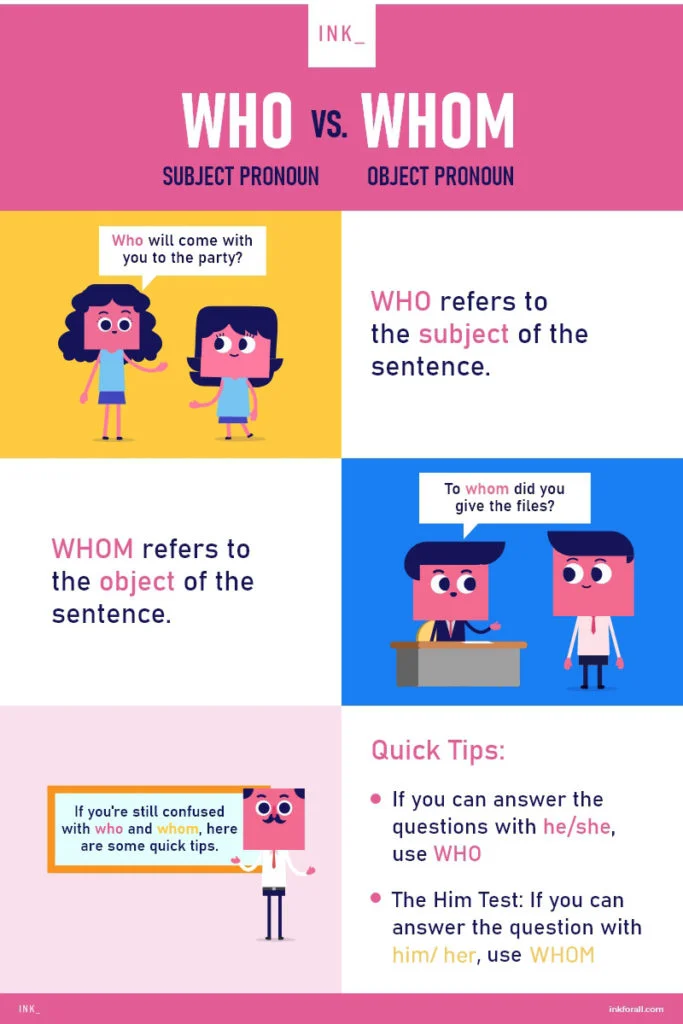
9. Who or Whom I Love so Much?
The correct way to phrase this whom I love so much,not who I love so much. We know that whom is correct because this pronoun refers to the object of a preposition or verb. We may not have a preposition, but we have the verb love. This verb refers to the person being loved (object), and not the I, or the person doing the loving (subject).
Since who refers to the subject while whom refers to the object of the verb, whom is correct. Check that whom is the correct pronoun by rewriting the sentence with him,her, or them. If the sentence is still grammatically correct with one of these other pronouns, then you know whom is correct. However, if he, she, or they fit better, then you know who is correct.
10. Who or Whom Wants Ice Cream?
Who wants ice cream is the correct way to phrase this sentence. The best way to confirm that who is the correct pronoun is to replace it with he/she/they. Does the sentence still make sense? Is it still grammatically correct? If yes, then you know who is correct. If no, then you should use whom.
What’s more, use who to refer to the subject of the sentence. Another way we know that who wants ice cream is correct option is because the subject of the sentence is who.
11. Is it “Who to Ask” or “Whom to Ask”?
The grammatically correct way to phrase this is whom to ask. The phrase to ask really means should I ask. Whenever we need a pronoun that refers to the subject, we use who.
However, when we need one that refers to the object of a preposition or a verb, we use whom. Here, the implied verb shouldrefers to implied subject I. So, now we need a pronoun to go with the verb ask.
Sincewhom refers to the object of the verb and not the subject, we know that whom is the correct pronoun. An easy way to confirm this is to rephrase the sentence using him/her/them. These work as substitutes for whom while he/she/they work for who.
12. Who to Follow or Whom to Follow?
Although the majority of people would probably say who, whom to follow is correct. This is because the phrase to follow actually means should I follow. Therefore, the implied verb should refers to implied subject I.
Since we use who to refer to the subject, we can rule out who. Instead, we use whom to refer to the object of the preposition or verb. Specifically, we need an object for the verb follow. This is why whom is the correct answer.
Easily verify this is by rephrasing the sentence using him/her/them. You can use these pronouns as substitutes for whom and the existence will remain correct. Similarly use he/she/they for who.
13. Who Should you Invite to the Party?
Even though most people would use who, the grammatically correct way to phrase this sentence is Whom should you invite to the party. The trick to know with certainty that the answer is whom is to rephrase the sentence using him/her/them. This is because we use whom to refer to the object of a preposition or verb, and these pronouns can substitute whom.
Conversely, we use who to refer to the subject of the sentence, and he/she/they can substitute who. In this example, the verb shouldrefers to the subject you. However, we need an object for the verb invite. Therefore, whom is the best fit.
Whom: Death of a Pronoun
Many modern grammarians consider whomto be a dying word.
It wouldn’t be the first pronoun to fall out of use, either. Others that have gone before it include thy, thine, ye, and thee. Although they may still show up in religious writing, they’ve fallen out of common use.
Although whom and whomever still have a place in formal writing, they are no longer common in spoken English. Many publications have also ceased using them. Instead, they opt to rephrase sentences to include easier-to-digest pronouns such as him, her, and them.
Who vs. Whom Recap
Who and whom are both pronouns. Depending on your sentence structure, you can easily determine which one to choose.
Ask yourself the following:
- Are you referring to the subject of the sentence? If so, use the pronoun who.
- Is the object of the sentence what you’re referring to? If so, use the pronoun whom.
Here’s a trick that you can use if you get stuck. When deciding on whom vs. who, think of it as him vs he.
- If you can answer the question with “he,” you’ll want to use who—no “m” at the end!
- However, if you can answer the query with “him,” you’ll want to use whom. They both have an “m” at the end!
But wait! What if you’re talking about a lady instead of a gentleman? No worries—we only used “he” or “him” because it makes it easier to highlight the “m” connection. While “whom“or“him” is a quick and memorable mnemonic device, the same idea applies to “she” or “her.”
- If you can answer the question with “she,” you’ll want to use who.
- On the other hand, if the answer to the question is “her,” you’ll want to use whom.
Ready to Dominate This Who vs. Whom Quiz?
Whom Question #1
A. Noun
B. Pronoun
C. Verb
D. Adverb
Correct!
Wrong!
The answer is B. “Whom” is an interrogative pronoun.
Who Question #2
A. The object of the sentence
B. The subject of the sentence
C. The object of the preposition
D. All of the above
Correct!
Wrong!
The answer is B. Use “who” when referring to the subject of a sentence.
Who vs. Whom Question #3
Please select 2 correct answers
A. The object of the verb
B. The subject of the sentence
C. The object of the preposition
D. All of the above
Correct!
Wrong!
The answers are A and C. Use “whom” when referring to the object of a verb or preposition.
Who or Whom Question #4
Correct!
Wrong!
The answer is C. While it’s easy to remember “him” because “m” is present, “her” will also do the trick.
Whom vs Who Question #5
Correct!
Wrong!
The answer is WHOM. Here, “whom” refers to the object of the verb.
Who and Whom Question #6
Correct!
Wrong!
The answer is WHO. “Who” refers to the subject of the sentence.
Read More: ??♀️ Whoever vs. Whomever: The Easiest Guide on When to use Which Pronoun
The question of when to use the word ‘whom’ is such a common issue that correcting people has become comic shorthand for pedantry; however, it really isn’t as complicated as sitcom writers would have you believe.
Both ‘who’ and ‘whom’ are pronouns used to identify or enquire about a person or persons. The thing you need to know when using them is the distinction between the ‘subject’ and ‘object’ of a sentence.
Who (Subject)
‘Who’ is a subject pronoun, meaning it typically refers to the active thing or person in the sentence:
The man who sold the world to Tony was called David.
Here, the word ‘who’ is correct because it refers to the subject of the sentence (‘the man’). It could also be used in a question, to which the answer would involve identifying the subject:
Who sold the world to Tony? David did.
Whom (Object)
‘Whom’ is an object pronoun and usually applies to the thing or person being acted upon in a sentence:
The person to whom David sold the world is called Tony.
The word ‘whom’ is used here because it refers to the recipient of the action, placing ‘Tony’ in the role of object. As above, this could be phrased as a question:
Find this useful?
Subscribe to our newsletter and get writing tips from our editors straight to your inbox.
To whom did David sell the world? He sold the world to Tony.
Who or Whom?
The difference between ‘who’ and ‘whom’ is often overlooked, but in formal or academic writing it’s still important to aim for perfection. Remember:
Who = Subject
Whom = Object
Essentially, ‘who’ is used if asking about or describing someone responsible for an action (‘the man who sold the world’) and ‘whom’ is used if enquiring about or describing the recipient of an action (‘the man to whom the world was sold’).
One good tip is to check whether a ‘who/whom’ question can be answered with ‘he’ or ‘him’: ‘him’ and ‘whom’ are both object words that end in ‘m’, so questions which can be answered with ‘him’ should be framed with ‘whom’.
For example, the question ‘Who tripped you?’ would be answered with ‘He tripped me’ since the tripper is the subject of the sentence.
On the other hand, the question ‘Whom did you trip?’ would be answered ‘I tripped him’ because ‘whom’ refers to the object of the sentence; responding ‘I tripped he’ would not make sense.
Download Article
Download Article
The correct use of who and whom in questions and statements may seem like a lost battle, still fought only by punctilious English teachers. However, using who and whom correctly can come in handy in formal writing, and it will make you seem more educated.
Steps
-
1
Understand the difference between who and whom. Both who and whom are relative pronouns.[1]
However, who is used as the subject of a sentence or clause, to denote who is doing something (like he or she).[2]
On the other hand, whom is used as a direct or indirect object of a verb or preposition.- While a preposition (at, by, for, in, with, etc.) often comes before whom, this is not always the case, so the key question is to ask, “Who is doing what to whom?” What follows is a quick way to determine which pronoun to use in a particular question.
-
2
Use who when referring to the subject of a sentence or clause.[3]
- Who brought the paper inside?
- Who talked to you today?
- Who went to dinner?
- Who ate the cake?
- Our job is to determine who qualifies.
Advertisement
-
3
Use whom when referring to the object of a verb or preposition.[4]
- To whom it may concern:
- To whom did you talk today?
- Whom does Sarah love?
-
4
Ask yourself if the answer to the question would be he/she/they or him/her/them. If you can answer the question with her, then use whom. It’s easy to remember because they both end with m. If you can answer the question with she, then use who.[5]
- Example: A suitable answer to the question, “To [who or whom] did the prize go?” is, “It went to them.” (It is improper to say “It went to they.”) The correct pronoun for the question is whom.
- Example: A suitable answer to the question, “[Who or Whom] went to the store?” is, “He went to the store.” (It is improper to say “Him went to the store.”) The correct pronoun for the question who.
-
5
When trying to decide whether who or whom is correct, simplify the sentence. Where other words in a complex sentence might throw you off track, simplify the sentence to include just the basic subject, verb, and object. It helps to move the words around in your head to identify the word relationships.[6]
For example:- “Marie Antoinette and her ladies-in-waiting only invited people to their party [who or whom] they considered to love parties as much as they did.” The simplified mental version becomes: “whom they considered.”
- “Marie Antoinette prevented her mother from knowing [who or whom] she invited to the Petit Trianon.” The simplified mental version becomes: “[who or whom] she invited.” Then, you could rearrange it again to say: “she invited whom”, clarifying that she did something to (invited) whom.
-
6
Remember that the distinction between who and whom is less important in informal spoken language than it is in formal written language. It’s possible that the distinction might someday erode altogether. For now, though, it is important to keep this clear in written language.
Advertisement
Add New Question
-
Question
Is it right to say, «To whom does this car belong?»
Yes.
-
Question
Which is correct: ‘for my sister, whom I love very much,’ or, ‘for my sister, who I love very much’?
In this case, whom is correct, because the object of your love is your sister Think about it this way — if a person is having the verb done to (with, about, for, etc.) them, you want to use whom.
-
Question
Is «whom are you going to invite» correct?
Yes, because in this sentence you are the subject, and the invited party will be the object of your action (being invited).
See more answers
Ask a Question
200 characters left
Include your email address to get a message when this question is answered.
Submit
Advertisement
Video
-
Ask yourself “who did what to whom?”[7]
-
Learning who and whom can help with grammar and understanding different languages. It is also good to know this if you want to speak fluent English and write correct sentences.
-
It is possible to write around problems involving who and whom, but the result is almost always clumsy. If you write “To which person did the prize go?” because you can’t remember that whom is the correct pronoun for such a question, you will have avoided a grammatical error at the expense of elegance.
Show More Tips
Thanks for submitting a tip for review!
Advertisement
-
There is much confusion and misuse on this topic. Just as correctly using whom may make others think that you are intelligent, misusing it may make you seem pompous. Never use whom as a subject pronoun. This is as incorrect as using who where whom is required. Many people will mistakenly believe that you are trying to be formal.
- “Whom are you?” is wrong. It is meant to be “Who are you?”
- “John is the man whom I expect will be awarded the prize” is wrong. It should be “John is the man who I expect will be awarded the prize.”
Advertisement
Sample Usage
About This Article
Article SummaryX
When you’re deciding between who and whom, try answering the question you want to ask. If you can answer the question using him or her, you should use whom. If you can answer it using he or she, use who. For instance, look at the question, “to [who
Did this summary help you?
Thanks to all authors for creating a page that has been read 2,315,423 times.
Did this article help you?
A lot of people have trouble on when to use the words who and whom. Mixing these words up can be relatively easy, and, if you confuse them too frequently, it can cause your writing to look sloppy.
So, in this post we’ll talk about the grammatical functions of who vs. whom as well as give you a few tricks to easily determine which word to use and when.
Now, to begin, both who and whom are pronouns, which means they are words used as substitutes for nouns. But even though they are both pronouns, they are used different in a sentence. Let’s take a look at each word.
When to Use Who

- Who ate the pizza?
- He ate the pizza.
In this example, who is acting as the subject of the sentence in the same way that he is.
When to Use Whom
When do you use whom? When whom is used in a sentence, it takes the objective form. That simply means that it acts as an object, either of a verb or preposition. For example,
- You called whom?
- You called him?
- I deliver the pizza to whom?
- I delivered the pizza to him.

In the first set, the word whom is acting as the object of the verb “call.” Whom did you call? I called him. It describes the person you called.
In the second set, the word whom is acting as the object of the preposition “to.” To whom did you deliver the pizza? I delivered the pizza to him. It describes the person to whom you delivered the pizza (to him).
Problem Sentences
Now, determining the case (nominative or objective) of these words can sometimes be tricky because who and whom so often find themselves in the form of a question.
This makes their true function within the sentence hard to see unless you sort the words into a standard subject-verb-object sentence. To help with this, I suggest changing sentences like the following ones into “I should say who is calling?” to make them easier.
- Wrong: Whom should I say is calling?
- Correct: Who should I say is calling?
By changing these sentences into the form “I should say who is calling?” you can more clearly see identify the subject, verb, and object.
Another problem that arises when determining the proper case is when the pronoun serves a function (for example, nominative) in a clause that itself serves a different function (for example, objective) in the main clause.
In situations like these, the pronoun’s function within its own clause determines its case. For example,
- WRONG: Give it to whomever wants it.
- CORRECT: Give it to whoever wants it.
- WRONG: Whoever you choose is fine by me.
- CORRECT: Whomever you choose is fine by me.
In the first example above, the entire clause “whoever wants it” is the object of the preposition “to.” But, in the clause itself, “whoever” serves as the subject, and that function determines the case.
Similarly, in the second sentence “whomever” is the object of “choose” in the clause, so it must be in the objective case even though the clause itself serves as the subject of the sentence.
Tricks to Remember
Now that you know the functions of whom vs. who within a sentence, I can show you an easy trick that can speed up the process of determining their cases.
If you still don’t know when to use who or whom, try simply substituting the words he/him in the clause where the whom or who appears. If “him” sounds better than “he” in the clause, use “whom” because “him” and “whom” both end in and “m” For our above examples,
- Wrong: I should say him is calling.
- Correct: I should say he is calling.
“Him” does not work in this sentence which means that “he” or “who” is the correct choice.
Summary
In short, who and whom have specific functions in a sentence, and it’s important to use each word correctly.
- The word “who” acts as the subject of a sentence.
- Who ate my pizza?
- The word “whom” acts as the object of a verb or preposition.
- Whom are you calling?
- To whom are you talking?
- You can substitute he/him for who/whom if you are having difficulties in determining their function within a sentence.
Contents
- 1 When to Use Who
- 2 When to Use Whom
- 3 Problem Sentences
- 4 Tricks to Remember
- 5 Summary

